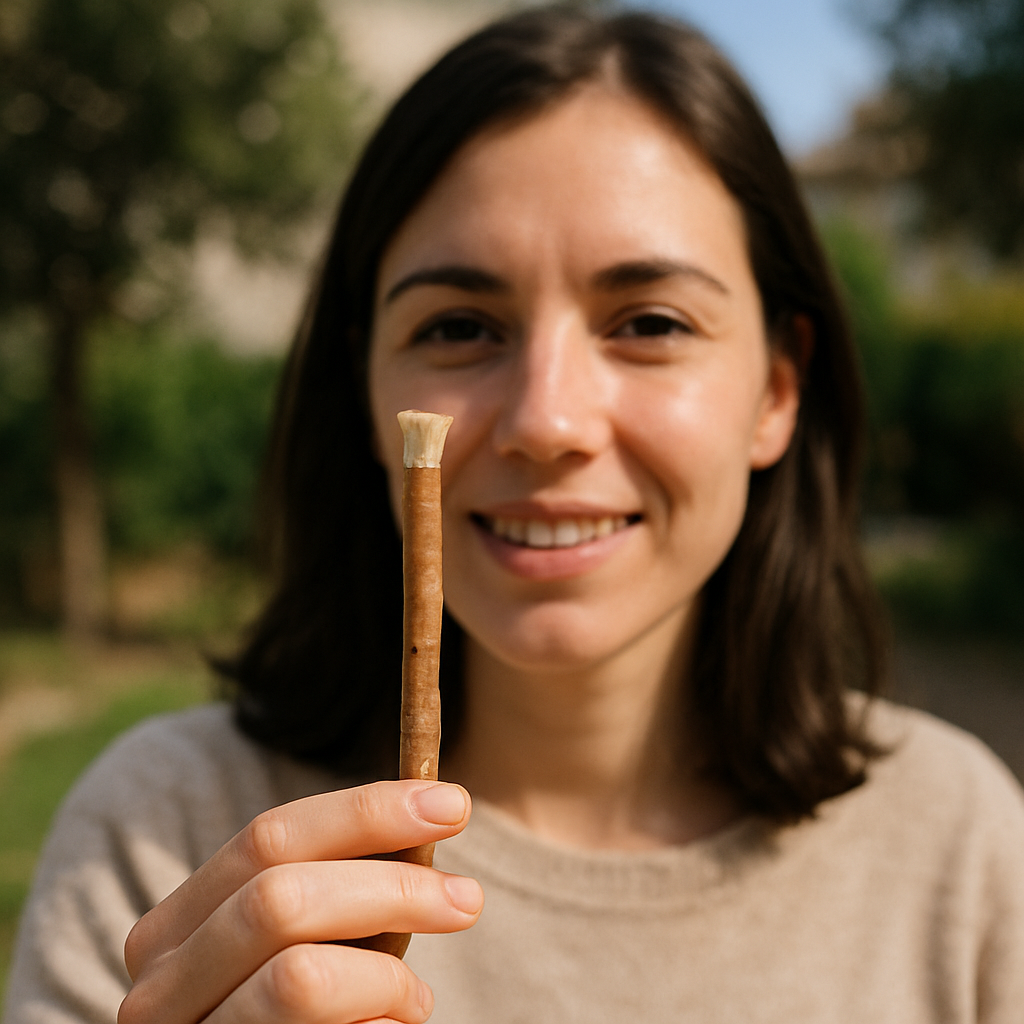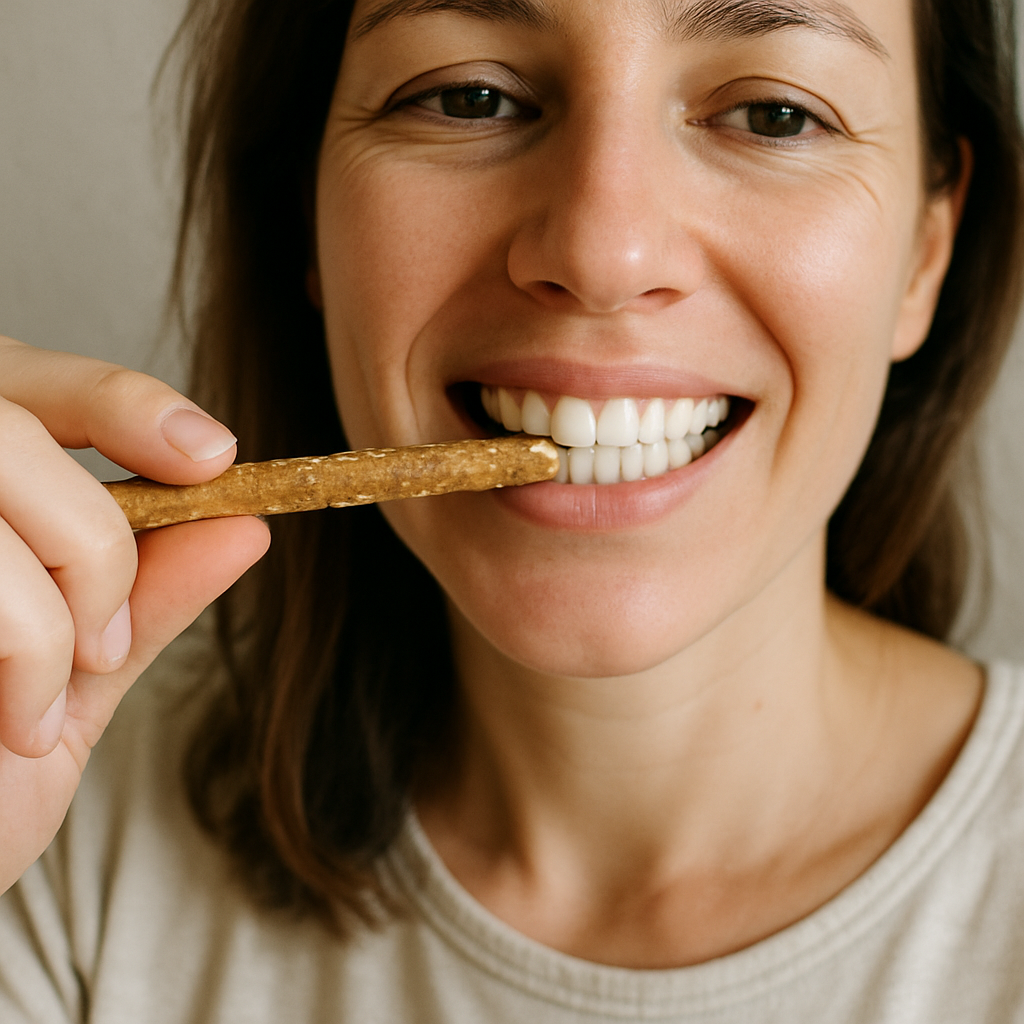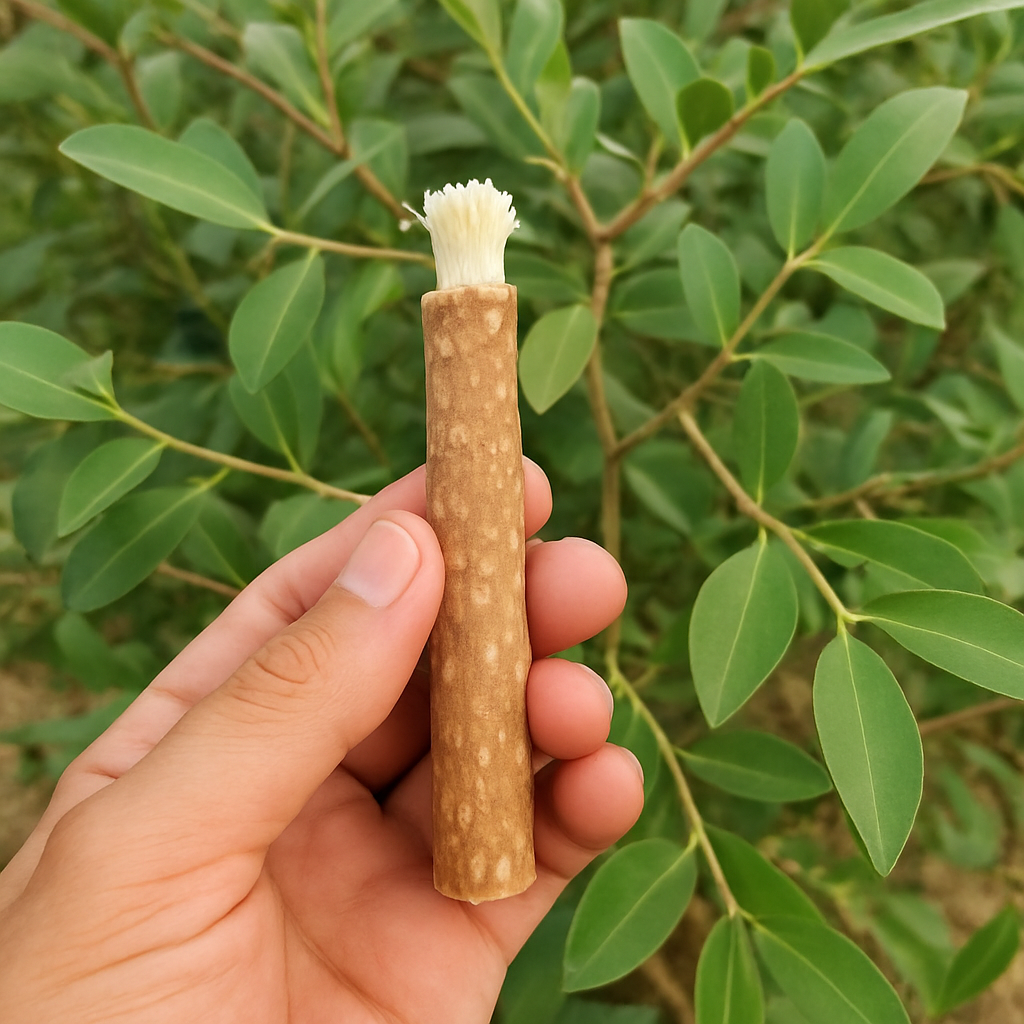Ask Ayurvedic doctor a question and get a consultation online on the problem of your concern in a free or paid mode. More than 2,000 experienced doctors work and wait for your questions on our site and help users to solve their health problems every day.
What Is Miswak and Why It’s Used for Natural Oral Care

What is miswak? Simply put, it’s one of the oldest natural solutions for oral hygiene that people still use today. A miswak stick, also known as a miswak toothbrush or miswak brush, comes from the Salvadora persica tree and has been praised for centuries because of its remarkable dental and overall health properties. People often ask: does miswak whiten teeth? or what are the real miswak benefits? The truth is, beyond just brushing, miswak is deeply rooted in tradition, spirituality, and science. From preventing plaque buildup to freshening breath naturally, this small stick has a big reputation. If you’ve ever been curious about what is miswak stick and why so many cultures still swear by it, you’re about to find out.

What Is Miswak: Origin, Meaning, and Plant Source
Miswak is more than just a plant twig; it’s a practice. Historically, it dates back thousands of years and was used in regions of the Middle East, South Asia, and Africa long before modern toothbrushes appeared. The miswak plant, scientifically known as Salvadora persica, is where these oral care sticks come from. It’s a desert shrub that thrives in arid climates, yet provides an incredible tool for natural dental care.
Miswak Meaning in Cultural and Religious Context
The miswak meaning goes beyond oral care — it carries religious and cultural significance. In Islamic tradition, Prophet Muhammad (peace be upon him) strongly recommended its use, and for many Muslims, the miswak stick remains a sunnah (recommended act). In other traditions, it’s been considered a symbol of cleanliness, humility, and natural living. So, when you hold a miswak toothbrush, you’re not only cleaning your teeth, you’re also participating in an ancient cultural practice with spiritual value.
What Is Miswak Stick and Its Botanical Background
So, what is miswak stick really? In plain words: it’s a cut branch or root from the miswak plant. The outer bark is peeled, and the fibers inside are softened to form bristles, making it look like a small natural brush. Unlike plastic toothbrushes, miswak sticks contain natural oils, fluoride, and antiseptic compounds that help fight bacteria. The botanical uniqueness of the Salvadora persica tree is what makes miswak brush stand out from any ordinary twig.
Miswak Stick Benefits for Oral and Overall Health
When it comes to oral care, the benefits of miswak are wide-ranging. A fresh miswak stick can remove plaque, reduce gum inflammation, fight harmful bacteria, and even freshen breath without the need for toothpaste. Unlike synthetic products, miswak is biodegradable and eco-friendly, adding environmental benefits to its long list of pros.
Dental Benefits: Does Miswak Whiten Teeth?
This is probably one of the most common questions: does miswak whiten teeth? Research and user experience suggest yes — over time, the natural abrasiveness of the fibers helps remove surface stains, giving teeth a cleaner, whiter appearance. It’s not as fast as chemical whitening strips, but it’s safe, gentle, and free of artificial chemicals. Plus, miswak stick benefits extend to preventing cavities, strengthening gums, and reducing the chances of gum disease.
Other Health Benefits of Miswak in Ayurveda
Beyond dental hygiene, Ayurveda (India’s traditional medicine system) highlights the broader benefits of miswak. According to Ayurvedic texts, miswak helps balance oral bacteria, improves digestion by stimulating saliva flow, and may even support mental clarity through its refreshing qualities. Some practitioners also note that the miswak plant extracts can reduce bad breath, making it a natural mouth freshener without side effects.

How to Use Miswak for Effective Dental Care
A lot of people hear about miswak stick benefits but aren’t sure how to use miswak properly. The truth is, it’s not complicated, but there are a few steps that make all the difference.
Step-by-Step Guide on How to Use Miswak
-
Choose a fresh stick – A fresh miswak stick is flexible, slightly moist, and gives off a faint herbal smell. Dry sticks won’t be as effective.
-
Peel the bark – Cut off about half an inch of the bark at one end of the stick.
-
Chew gently – Bite the exposed end until the fibers separate, creating natural bristles.
-
Brush in all directions – Use the miswak toothbrush just like a regular brush, moving it vertically, horizontally, and in circular motions.
-
Trim regularly – After a few days, cut off the used bristles and peel a fresh section.
That’s pretty much it. No toothpaste, no water, no mess. Just a natural miswak brush that works wherever you are.
Tips for Maintaining a Miswak Toothbrush
-
Store in a clean, dry place but avoid airtight containers (they can cause mold).
-
If it gets too dry, soak it in water for a few hours to revive it.
-
Replace with a new stick every few weeks, depending on how often you use it.
-
If you’re traveling, wrap it in a breathable cloth instead of plastic.
These small tips will keep your miswak brush fresh and effective for daily use.

Miswak vs Modern Toothbrushes
Now, let’s be real: many people wonder if miswak can actually compete with the modern plastic toothbrush. The answer? Yes and no.
-
Cleaning ability: Studies show miswak sticks can clean teeth just as well, sometimes even better, at reducing plaque and preventing gingivitis.
-
Convenience: Miswak is portable and doesn’t require toothpaste, which makes it ideal for travel or situations without running water.
-
Eco-friendliness: Miswak plant twigs are biodegradable, unlike the millions of plastic toothbrushes that end up in landfills each year.
-
Cost: One miswak stick can last weeks, while toothbrushes and toothpaste often need replacing faster.
That said, some people feel more comfortable with a modern toothbrush because of habit, availability, or preference. You could even combine both: use miswak during the day for freshness and a regular brush with toothpaste in the morning and evening.
How to Select a Fresh Miswak Stick
When buying, avoid dried-out or very thin sticks. A proper miswak stick should be about the thickness of your pinky finger and slightly bendable. The fresher it is, the more effective its natural compounds will be. If it looks brittle, it’s probably too old.

Miswak in Ayurveda and Traditional Medicine
Miswak isn’t just an old toothbrush — in Ayurveda and other traditional healing systems, it’s considered medicine. Ayurvedic practitioners have long emphasized oral care as part of whole-body health, and miswak plays a key role here.
Ayurvedic Perspective on Miswak Benefits
In Ayurveda, miswak is seen as more than just a tool for brushing teeth. It’s considered a cooling herb, balancing excess heat in the body. Oral health is directly linked to digestion in Ayurvedic philosophy, so by using a miswak stick daily, you’re not just cleaning your mouth but also supporting your gut health. Some Ayurvedic texts even claim it enhances memory and sharpens the senses — though modern science hasn’t confirmed all of these claims. Still, it shows how deeply valued this small twig has been across centuries.\
Role of Miswak Plant Extracts in Oral Health
Modern research is starting to back up what ancient medicine already knew. Scientists have studied miswak plant extracts and found that they contain compounds like fluoride, silica, tannins, vitamin C, and essential oils. Each of these contributes to oral care in a unique way:
-
Fluoride strengthens enamel and prevents cavities.
-
Silica acts as a mild abrasive, helping to scrub stains and polish teeth.
-
Tannins reduce plaque formation and fight bacteria.
-
Vitamin C helps strengthen gums and supports healing.
-
Natural oils freshen breath and maintain oral moisture.
In fact, some modern toothpastes now include miswak extract as an active ingredient, trying to bring together the best of both worlds: tradition and modern science. But many people still prefer the raw stick for its authenticity and holistic impact.
Conclusion
So, what is miswak? It’s more than just a twig. It’s a living tradition, a natural toothbrush, and a symbol of sustainable health care. From the miswak meaning in cultural and religious contexts to the proven miswak stick benefits for oral and overall health, this plant has earned its place in both history and science.
We’ve explored how to use miswak, whether miswak whitens teeth, and how it compares with modern toothbrushes. We’ve also seen how Ayurveda and traditional medicine view the miswak plant as a powerful tool for balancing not just oral health but whole-body wellness.
In a world overflowing with synthetic products, miswak offers something different: simplicity. It’s eco-friendly, affordable, spiritual, and scientifically supported. If you’ve never tried it, maybe it’s time. Pick up a fresh miswak brush and see for yourself why this ancient practice still thrives today.
If you found this guide useful, share it with a friend who cares about natural living. You never know — they might discover their new favorite daily ritual in something as simple as a twig.
FAQs
How often should I use a miswak stick?
You can use miswak several times a day — traditionally before prayers or meals. For best results, replace the used end every couple of days and trim it fresh.
Can miswak replace toothpaste?
Yes, for many people it does. The miswak stick naturally contains fluoride and antibacterial agents. That said, if you’re used to modern toothpaste, you can combine both — no strict rules here.
What plant is miswak made from?
The miswak plant is Salvadora persica, also called the arak tree. It grows in dry regions across Africa, the Middle East, and South Asia.
Is miswak safe for children?
Yes, but with guidance. Miswak sticks are safe, though younger children may need help preparing and using them properly. Always supervise until they get the hang of it.

